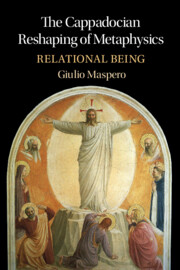Book contents
- The Cappadocian Reshaping of Metaphysics
- The Cappadocian Reshaping of Metaphysics
- Copyright page
- Contents
- 1 Introduction
- 2 Rational Logos
- 3 Relational Logos
- 4 Life from Life
- 5 Philosophical Relation in History
- 6 The Cappadocian Reshaping
- 7 Knowledge and Relation
- 8 Epistemology and Openness
- 9 Conclusions
- Bibliography
- Index
3 - Relational Logos
Published online by Cambridge University Press: 11 January 2024
- The Cappadocian Reshaping of Metaphysics
- The Cappadocian Reshaping of Metaphysics
- Copyright page
- Contents
- 1 Introduction
- 2 Rational Logos
- 3 Relational Logos
- 4 Life from Life
- 5 Philosophical Relation in History
- 6 The Cappadocian Reshaping
- 7 Knowledge and Relation
- 8 Epistemology and Openness
- 9 Conclusions
- Bibliography
- Index
Summary
Here we show how Christian revelation changed the concept of the Logos that the Cappadocian Fathers recognized in the very immanence of the divine, unique and eternal substance, reinterpreting it, with Gregory of Nyssa, in a relational sense. But this also implied the need to recognize the will in the very immanence of God, distinguishing the processions of the second and third divine Persons. The metaphysical framework is so characterized by two distinct ontologies separated by a boundless gap, since the first, which coincides with the Trinity, is eternal and infinite, while the second, that is, the created world, is finite and has a beginning in time.
- Type
- Chapter
- Information
- The Cappadocian Reshaping of MetaphysicsRelational Being, pp. 36 - 70Publisher: Cambridge University PressPrint publication year: 2023

